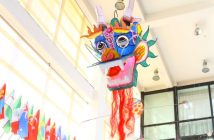Although Beijing’s winters are mired by smoggy days, Solvita Klapare and Paavo Eliste often maintain a sunny attitude. The couple, who hail from Latvia and Estonia, respectively, and have a daughter named Kristiina enrolled in Year One Primary School classes at Yew Chung International School of Beijing (YCIS Beijing), are quick to point out the silver linings when Beijing’s skies go grey.
“There are so many nice days here too, lots of nice green parks like Chaoyang and Ritan,” Klapare says, adding: “People outside of Beijing often don’t realize the good that’s here too.”
Below, Klapare and Eliste tell us more about making their family thrive despite the (describe this PM2.5s).
Klapare: As bad as the pollution can be here, I feel better when I discuss it with my friend from New Delhi. Whenever I complain that the smog is bad he’ll say “What pollution? Today it’s so clear. Back home the AQI can reach 600!” Also, our daughter was born in Cambodia, and compared to that she spends more time outside here in Beijing because it was so hot and humid there.
Eliste: Whenever I describe Beijing’s smog to people back home, I tell them it’s bad, but not as dramatic as it has often been portrayed in the media. There are bad days and good days, that’s how I always tend to think.
Klapare: Despite that, we still have to take many precautions against the pollution. We have air filters in all our rooms at home, and use them all the time, even when the AQI is fairly low.
Eliste: Air purifiers are the most important part of this. We invested a massive amount of money into this, and it’s actually working very well. I’ve also taped the windows in our bedrooms to keep the pollution out.
Klapare: We have our daughter wear a VOG mask and use 3M ourselves. When we pick our masks, we try to make sure they are at least M95 or higher US certified because they are the most effective against PM2.5s.

Kristiina’s parents are sure to have her wear a VOG mask on smoggy days
Klapare: One of the reasons that we chose to enrol our daughter at YCIS Beijing is the care they take with air quality. They have very good quality filters in all the classrooms, and parents also have opportunities to check the AQI in each of the school’s buildings online, which is a very good feature. And, on badly polluted days, they restrict outdoor activities, which we also think is a very good policy.
Eliste: We actually looked at a number of schools and YCIS Beijing topped our list because of this. We like that they feel air quality is so important.
Klapare: We check the AQI constantly, using the Beijing measurement and the US embassy measurement. We try to limit outdoor activities when the AQI is above 200. We appreciate the health benefits that outdoor play gives children, but we don’t want to go out when it’s severely polluted. Depending on the day, our daughter will wear a mask when she’s playing, going to the shop, or school.
Eliste: We don’t have to work too hard to comfort our daughter on polluted days. We are from northern Europe, so we are used to long dark winters. We don’t take it very seriously or get depressed; we just try to be patient through it. I don’t recall myself getting too stressed.
Klapare: However, long term exposure to PM2.5s does concern us. Even if the AQI is relatively low, it still is harmful over time, so on holidays we try to get out of Beijing to find blue skies and breathe fresh air. This is one of our best coping mechanisms.
Eliste: One thing that bothers me is that the pollution makes it so difficult to plan anything ahead of time. So we tend to play everything by ear, and not plan too many outdoor activities on weekends, because we just never know. But if we see that it looks good outside, then we try to quickly take advantage of it and spend time outside.
Klapare: Also, Paavo, didn’t you want to mention one more thing? Go head (laughs).
Eliste: Should I?
Klapare: Go ahead.
Eliste: I was thinking that, if I had to choose one song to soundtrack Beijing’s pollution, it would be AC/DC’s “Highway to Hell.” Especially on the very heavily polluted days.
This article is sponsored by Yew Chung International School of Beijing (YCIS Beijing)
Photos: Solvita Klapare




